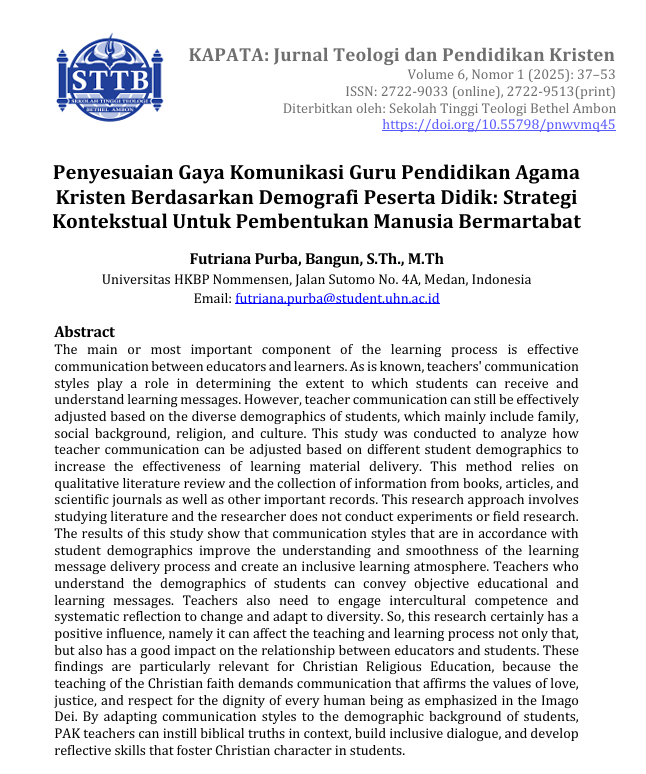PENYESUAIAN GAYA KOMUNIKASI GURU PENDIDIKAN AGAMA KRISTEN BERDASARKAN DEMOGRAFI PESERTA DIDIK
STRATEGI KONTEKSTUAL UNTUK PEMBENTUKAN MANUSIA BERMARTABAT
DOI:
https://doi.org/10.55798/pnwvmq45Keywords:
Gaya komunikasi guru, demografi peserta didik, Pendidikan agama Kristen, komptensi antarbudaya, pembelajaran inklusifAbstract
The main or most important component of the learning process is effective communication between educators and learners. As is known, teachers' communication styles play a role in determining the extent to which students can receive and understand learning messages. However, teacher communication can still be effectively adjusted based on the diverse demographics of students, which mainly include family, social background, religion, and culture. This study was conducted to analyze how teacher communication can be adjusted based on different student demographics to increase the effectiveness of learning material delivery. This method relies on qualitative literature review and the collection of information from books, articles, and scientific journals as well as other important records. This research approach involves studying literature and the researcher does not conduct experiments or field research. The results of this study show that communication styles that are in accordance with student demographics improve the understanding and smoothness of the learning message delivery process and create an inclusive learning atmosphere. Teachers who understand the demographics of students can convey objective educational and learning messages. Teachers also need to engage intercultural competence and systematic reflection to change and adapt to diversity. So, this research certainly has a positive influence, namely it can affect the teaching and learning process not only that, but also has a good impact on the relationship between educators and students. These findings are particularly relevant for Christian Religious Education, because the teaching of the Christian faith demands communication that affirms the values of love, justice, and respect for the dignity of every human being as emphasized in the Imago Dei. By adapting communication styles to the demographic background of students, PAK teachers can instill biblical truths in context, build inclusive dialogue, and develop reflective skills that foster Christian character in students.
Downloads
References
Anggraini, C., Denny, M., Ritonga, H., Kristina, L., Syam, M., & Kustiawan, W. (2022). Komunikasi interpersonal. Jurnal Multidisiplin Dehasen, 1(3), 337–342.
Ardiansyah, A. C. (2023). Pengaruh komunikasi efektif dalam era teknologi konteks pendidikan. Seminar Nasional Hasil Riset dan Pengabdian, 704–720.
Asmira, M., Piza, M. H. D., Febriansyah, R., & Haryati. (2023). Penerapan strategi komunikasi organisasi di lembaga bidang pendidikan. Jurnal Review Pendidikan dan Pengajaran, 6(4), 4128–4133.
Asriadi. (2020). Komunikasi efektif dalam organisasi. Cendekia Inovatif dan Berbudaya, 2(1), 36–50. https://doi.org/10.59996/cendib.v1i3.318
Aip, S. (2020). Tren demografi dan pengaruhnya terhadap pendidikan. Jurnal Jendela Bunda.
Arifin. (2007). Dasar-dasar demografi. Lembaga Penerbit FE UI.
Bangun, B., Ida Ike Siregar, S., & Rajagukguk, W. (n.d.). Human Development Index and Junior Secondary National Exam Scores in Indonesia. In International Journal of Environmental Sciences (Vol. 11). https://www.theaspd.com/ijes.php
Chandler, D. J. (2015). WHOLE-PERSON FORMATION: AN INTEGRATIVE APPROACH TO CHRISTIAN EDUCATION 3. In CEJ: Series (Vol. 3, Issue 2).
Cohen-Malayev, M., Schachter, E. P., & Rich, Y. (2014). Teachers and the religious socialization of adolescents: Facilitation of meaningful religious identity formation processes. Journal of Adolescence, 37(2), 205–214. https://doi.org/10.1016/j.adolescence.2013.12.004
Dewy, D. V. (2018). Pengaruh pekerjaan orang tua, fasilitas belajar, dan motivasi terhadap hasil belajar matakuliah pedagogik mahasiswa Prodi Pendidikan Ekonomi Universitas Negeri Surabaya. JUPE, 6(3), 256–265.
Fatmawati, I., Saputra, B. R., Nur Agustin, I. N., Shofana, N., Wardhani, N. I., & Saputra, B. R. (2021). Peran komunikasi dalam peningkatan kinerja organisasi di pendidikan. Improvement: Jurnal Ilmiah untuk Peningkatan Mutu Manajemen, 8(1), 1–17. https://doi.org/10.21009/improvement.v8i1.18296
Filipović, A. T., & Jurišić, M. (2024). Intercultural Sensitivity of Religious Education Teachers in Croatia: The Relationship between Knowledge, Experience, and Behaviour. Religions, 15(2). https://doi.org/10.3390/rel15020176
Fitri, N. L., Usiono, Adha, C., Izzatunnisa, & Nasution, S. F. (2023). Pentingnya penerapan komunikasi efektif dalam konteks pendidikan. Innovative: Journal of Social Science Research, 3(6), 5241–5251.
Fory Armin Naway. (2017). Komunikasi dan organisasi pendidikan. Ideas Publishing.
Gašpar, A., & Garmaz, J. (2016). The Corpus-based Study on the Impact of Religious Education on the Humanization of Man and Devel-opment of Religious Competence (Vol. 2).
Gudykunst, W. B., & Kim, Y. Y. (1997). Communicating with strangers: An approach to intercultural communication (4th ed.). McGraw-Hill.
Ha, N. T. (2021). Effects of learning style on students achievement: Experimental research. Linguistics and Culture Review, 5(4), 329–229.
Hendra, T., & Saputri, S. (2020). Korelasi antara komunikasi dan pendidikan. Ishlah: Jurnal Ilmu Ushuluddin, Adab, dan Dakwah, 2(1), 51–63.
Khodijah Ismail. (n.d.). Buku ajar demografi.
Maonde, F., Lambertus, & Marlina, M. (2015). Pengaruh status pekerjaan orang tua terhadap hasil belajar matematika melalui kombinasi model pembelajaran kooperatif. Jurnal Pendidikan Matematika, 6(1), 59–70.
Munir, M., Umailiha, R. S., & Rahmawati, S. (2024). Konsep dasar komunikasi dalam pendidikan. Cermin Jurnal, 40–42.
Maulia, S., & Purnomo, H. (2023). Peran komunikasi efektif guru dalam meningkatkan motivasi belajar siswa sekolah dasar. Jurnal PGSD STKIP PGRI Banjarmasin, 5(1), 25–39. https://doi.org/10.33654/pgsd
Naway, F. A. (2017). Komunikasi dan organisasi pendidikan. Ideas Publishing.
Nur, M., Hairunisa, & Mariyah, S. (2022). Studi komparatif intensitas dan hasil belajar siswa laki laki dan siswa perempuan di Madrasah se Kota Tanjungpinang. Jurnal Manajemen dan Ilmu Sosial, 22–34.
Pinem, Y. S. B. (2021). Hubungan komunikasi interpersonal orang tua anak terhadap hasil belajar peserta didik kelas V SD Masehi No. 4 Kabanjahe TA 2020/2021 (Disertasi Doktoral). Universitas Quality Berastagi.
Puspitasari, D., & Putra Danaya, B. (2022). Pentingnya peranan komunikasi dalam organisasi: Lisan, nonverbal, dan tertulis. Jurnal Ekonomi Manajemen Sistem Informasi, 3(3), 257–268. https://doi.org/10.31933/jemsi.v3i3.817
Purba, M., Nina, P., & dkk. (2021). Naskah Akademik Prinsip Pengembangan Pembelajaran Berdiferensiasi pada Kurikulum Fleksibel sebagai Wujud Merdeka Belajar. Jakarta: Pusat Kurikulum dan Pembelajaran, BSU, Kemdikbudristek RI.
Parawangsa, E., Hanani, T. N., Putra, M. R. S., Rostika, D., & Sudarmansyah, R. (2024). Optimasi komunikasi guru siswa di sekolah dasar untuk membangun hubungan positif dalam proses pembelajaran. JLEB: Journal of Law, Education and Business, 2(1), 722–728. https://doi.org/10.57235/jleb.v2i1.1980
Rambe, S. H., Purba, F. A., Meipia, T. A., Manik, R. S., Siramemare, A., & Anggraini, E. S. (2024). Tantangan dan strategi komunikasi dalam meningkatkan efektivitas lembaga organisasi PAUD di TK An Nijam. Jurnal Kajian Penelitian Pendidikan dan Kebudayaan, 2(3), 118–126. https://doi.org/10.59031/jkppk.v2i3.437
Razzak, F., Shaikh, S., & Siddiqui, A. H. (2019). Exploring effects of learning styles on learning outcomes. New Horizons Research Journal Faculty of Social Sciences, 13–30.
Richardson, J. T., & Woodley, A. (2003). Another look at the role of age, gender and subject as predictors of academic attainment in higher education. Studies in Higher Education, 28(4), 475–493.
Rohyan, M. R., & Machsunah, Y. C. (2023). Komunikasi efektif dalam dunia pendidikan. EDUSOSTECH: Journal of Education, Social Science and Technology, 1(1), 46–51.
Suryana, C. (2021). Komunikasi kebijakan pendidikan. Surabaya: CV. Jaked Media Publishing.
Simamora, I. Y., Zahra, M., Sinaga, W. A., Pandiangan, H. E., & Hasibuan, S. F. (2024). Peran komunikasi dalam pembangunan pendidikan. Jurnal Pendidikan Tambusai, 8(1), 4906–4913.
Stevani. (2016). Analisis pengaruh latar belakang sosial ekonomi orang tua terhadap hasil belajar pembelajaran ekonomi siswa SMAN 5 Padang. Jurnal Curicula, 43–50.
Ta, N. C. (1986). Aspek aspek demografik perencanaan pendidikan (Dewan Redaksi Bhratara, Penerjemah). Jakarta: Bhratara Karya Aksara & UNESCO.
Tri Indah, K. (2016). Komunikasi verbal dan nonverbal. Jurnal Pendidikan dan Konseling, 6(2).
Tri Kurniawati, & Putri, N. A. R. (2023). Pemahaman keberagaman peserta didik berdasarkan profil peserta didik sebagai upaya pemenuhan target Kurikulum Merdeka. Jurnal Ecogen, 269–270.
Ujang, M. (2021). Komunikasi pendidikan: Urgensi komunikasi efektif dalam proses pembelajaran. JOPPAS: Journal of Public Policy and
Administration Silampari, 2(2), 80–90. https://doi.org/10.31539/joppa.v2i2.2385
Vygotsky, L. S. (1978). Mind in society: The development of higher psychological processes. Harvard University Press.
Wisman, Y. (2017). Komunikasi efektif dalam dunia pendidikan. Jurnal Nomosleca, 3(2).
Yuliana, A. S., Ridho, A., Zalwana, & Sumarno. (2024). Komunikasi di dunia pendidikan di era digital. Journal of Social, Computer and Religiosity (SCORE), 3–6.
Zigarelli, M. (2012). Training, Transforming, and Transitioning: A Blueprint for the Christian University. Journal of Research on Christian Education, 21(1), 62–79. https://doi.org/10.1080/10656219.2012.661245
Zulfiqar, A., Issabek, A., Oliveira, W., Hamari, J., & Bogdanchikov, A. (2025). The effects of demographic factors on learners’ flow experience in gamified educational quizzes. Smart Learning Environments

Downloads
Published
Issue
Section
License
Copyright (c) 2025 Futriana Purba, Bangun Bangun (Author)

This work is licensed under a Creative Commons Attribution-NoDerivatives 4.0 International License.









